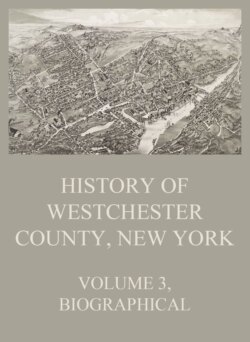Читать книгу History of Westchester County, New York, Volume 3 - Группа авторов - Страница 77
На сайте Литреса книга снята с продажи.
HART, MONMOUTH G.
ОглавлениеThe subject of this memoir was the third son of Gedney and Hannah (Downing) Hart, and was born December 3, 1850, in the town of Greenburg, in a house now standing on Chatterton Hill road. During his boyhood his parents removed to a farm on Central avenue, and there he spent the greater part of his life. He pursued his education in the old brick school-house, which is still standing, on the road between White Plains and Elmsford, and also spent one term in Professor Moody's select school, at White Plains. At sixteen years of age he put aside his text-books, and entered upon an independent business career by accepting a position as clerk in the dry-goods store of E. B. Taylor, on Main street, Yonkers, where he remained for two years, when, on account of failing health, he returned to the farm. He was too ambitious to remain there for any great length of time, however, and after a year he began studying law in the office of Charles S. Purdy, of White Plains. In 1869 he entered the law department of Columbia College, in which he pursued a two-years course, teaching in the district school in Bronxville during the vacations of 1869 and 1870. He was graduated with honor and admitted to the bar, but did not at once begin an independent practice. Upon receiving his diploma he entered the office of Marshall & Verplanck, prominent attorneys, and soon became their managing clerk, attending to a large part of their litigated business. He was thus engaged until 1875, when he opened an office of his own. He was a most diligent and painstaking student, but in his early career it was thought by many that he would not achieve great success in the profession on account of his retiring disposition. In manner he was very unobtrusive, shrinking from public praise and avoiding everything that seemed to partake of the nature of ostentation. Success, however, did come to him as the result of his methodical habits and marked ability. He made it a rule of his professional career to be at his office the same hour every day, to remain there for a certain length of time, and to attend to such matters as might be entrusted to his management with thoroughness. His devotion to his clients' interests was proverbial, and this, added to his comprehensive understanding of the principles of jurisprudence, contributed not a little to his success. Working on quietly and patiently year after year, his practice steadily increased and he advanced in public favor. He resided at the family homestead in the town of Greenburg and there served as justice of the peace for two terms or eight years, until 1892, when he resigned. He had been the protector of his mother after the father's death, and remained at the old home until Mrs. Hart also was called away, when he removed to White Plains. He was also for a number of years attorney for the town of Greenburg and a member of the town board. He was by no means a politician in the sense of office-seeking, much preferring to devote his time and attention to his profession, yet realized fully the responsibility attaching to citizenship, and aided in nominating and electing good men of the Democratic party, in whose principles he believed so firmly.
When a young man Monmouth Hart united with the Presbyterian church, at White Plains, was ever active in its work, served as trustee for twenty-one years and was also treasurer and elder of the church for a number of years. He was a member of the Westchester County Historical Society and served therein as secretary and treasurer. He was also prominent in the White Plains Good Government Club, a director in the White Plains Bank, which he aided in organizing, and a trustee in the Savings Bank, serving as attorney of both financial institutions. His clientage was large and he was a safe counselor, his judgment being sound and his conclusions correct. His main practice was in real-estate law and in the surrogate court, but he was well versed in the various departments of jurisprudence. In his particular lines he stood very high, not only by reason of his eminent trustworthiness and thoroughness but also for his marked ability. He was truly a good man, noble-spirited and generous, — traits which were manifest in his treatment of poor clients, whom he served as faithfully as those able to pay large fees. But his ambition was greater than his strength, and his devotion to business caused his health to fail. He frequently visited the south for the benefit of his health, but died suddenly of pneumonia, December 7, 1895, just as he was entering upon his forty-fifth year. He died with a firm faith in the Christian religion and his death was mourned by many friends who gathered to pay their last tribute of respect as he was laid to rest in Rural cemetery, by the side of his mother, to whom he was ever most devoted.
